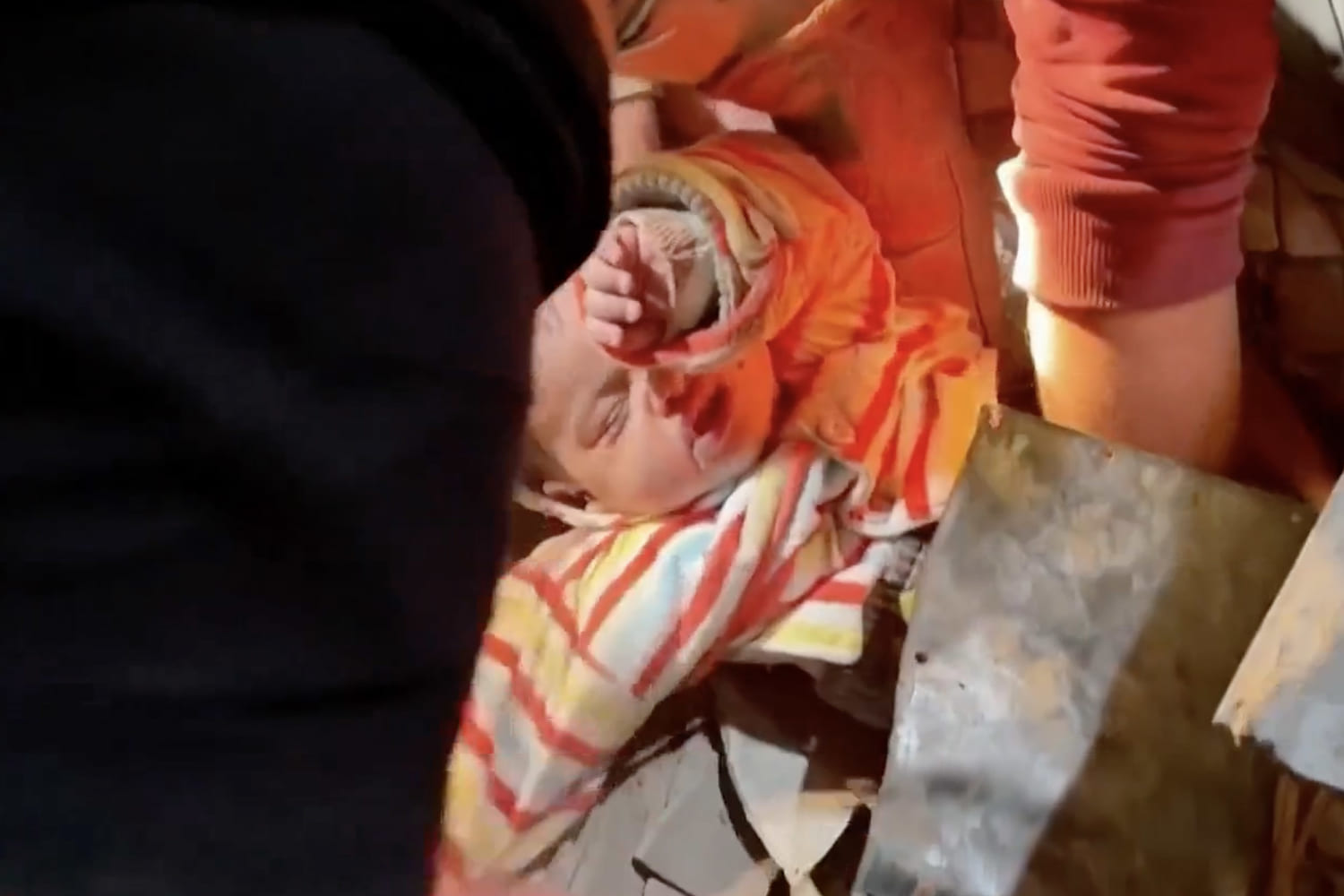In Rafah, baby Tala’s survival was a miracle. Her death 18 days later was a nightmare.

TEL AVIV — It was a moment of elation amid tragedy in December as baby Tala Rouqa was pulled from the rubble, unconscious but miraculously alive, after an airstrike crushed the home in Rafah where she and her family had hoped to find refuge from the war.
“She’s alive!” rescuers cheered, as a neighbor bundled her in his arms and raced her to the nearby hospital, in a scene captured by NBC News’ crew on the ground.
Her mother’s limp hand could be seen nearby in the rubble — perhaps reaching out towards, perhaps slipping from, her daughter. The mother was killed in the strike, along with at least 20 people, according to Palestinian health officials.
Tala’s sister Toleen, her brother, Youssef, her grandmother and several other relatives were among those killed.
For Tala’s father, Ahmad Rouqa, who was seriously injured, but survived the Dec. 28 attack, her rescue was a “glimmer of hope.”
But more than two weeks later, in the early hours of Jan. 15, Tala died too, plunging the grieving father into a new depth of despair.
The exact cause of Tala’s death is not clear, but she’s believed to have succumbed to her injuries, for which she was still receiving treatment.
“I hoped that she would remain with me in this life, as a memory of her mother and her siblings, her aunts and her uncles,” Rouqa said. “But praise Allah, she died. She is with God; it’s better than anything.”
Israel’s military previously did not say what it was targeting in the strike that killed the Rouqa family, but has said its bombing campaign is aimed at dismantling Hamas’ military abilities and rescuing hostages. The Israel Defense Forces did not respond to a request for further comment from NBC News.
Tala, who had suffered deep burn wounds and a broken leg, died just days before her first birthday, her father said. She was meant to undergo surgery for injuries she sustained in the strike, but doctors had urged her family to wait until she was at least a year old for her own safety during the operation.
“To this moment, I am shocked,” Rouqa said. “How did she die? I thought she got better, and there were treatments,” but, he said, “she suffered complications, and she died.”
Rouqa said his family had first fled from Gaza City after Israel launched its ground offensive in the enclave’s north, ordering Palestinians to evacuate the area and move south, where they were promised relative safety.
But when the bombs also started to drop on Khan Younis, the family fled further south to Rafah, near the Egyptian border, where they were assured once again by Israeli forces that they would be safe.
“It’s not safe for anyone. There is nowhere safe anywhere here in Rafah,” Rouqa said in a previous interview. “It’s a big lie to say that it’s safe. It’s a big lie, what the Israelis are saying.”
Rouqa described how before the war, he and his family were determined to make the most of life.
“We had no relationship with politics. Nothing. We loved life,” he said. “Every week, we were going out as a family to the beach, a picnic.”
And his children, he said, “were my hope in this life. I’m like anyone else: I wanted to have my own family … I wanted someone to say baba,” Arabic for dad, “to me.”
“This war changed our lives,” he said. “Now, we lost everything … they are slaughtering us in front of the world.”
More than 100 days have passed since Israel launched its offensive on Gaza after Hamas’ Oct. 7 attack, which saw more than 1,000 people killed and some 260 people taken hostage, according to Israeli officials. In that time, more than 24,900 people have been killed in Gaza, with over 62,000 others injured while thousands more are missing and presumed dead, according to Palestinian authorities.
More than 85% of Gaza’s population of roughly 2.2 million people have been displaced by the war as families attempt to escape Israel’s bombardment, leaving them in a shrinking sliver of the Strip, grappling with a worsening humanitarian crisis where access to food, water, medicine and other essentials is scarce.
Rouqa said he hopes the violence in Gaza will soon come to an end.
“I have lost the most precious thing I have. I don’t want others to lose their children, to lose themselves, because war is destruction,” Rouqa said. “We are the victims in every way. The people, we are the victims.”
In gutwrenching video captured by NBC News’ team on the ground, the grieving dad can be seen tearing open the shroud that enveloped Tala’s lifeless body as she was laid in her grave.
Cupping her pale face in his hands, he wails as others try to console her. “She’s with her mom,” one person says.
“I can’t stop thinking about her. I miss her,” Rouqa later told NBC News. “I miss her siblings. I miss her mom.”
Holding up his phone to show a photo of Tala’s smiling face, Rouqa said it was the last picture taken of her before she died. Now, he said, “she’s in God’s hands.”
“She gave me hope in this life,” he said. “Her death killed everything for me.”





